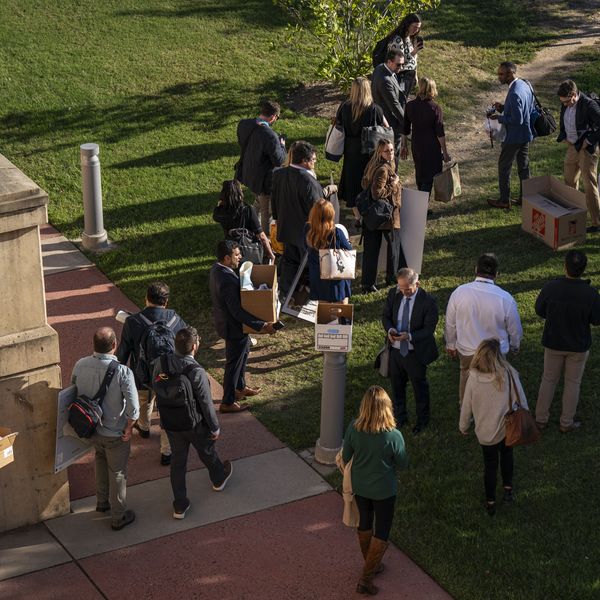While some news outlets are lining up to attend a series of "off the record" media briefings with the Department of Justice, others are balking at the invitation from embattled Attorney General Eric Holder, saying that it would be "inappropriate" to accept the government's conditions of secrecy as they actively report on how the DOJ "secretly" investigates journalistic activities.
What lies beneath the surface, however, is a striking example of how subservient the overall Washington press corps has become in the face of unchecked government authority to grant itself massing spying capabilities while stifling the flow of information it deems threatening to its power.
Earlier this week, the DOJ said it would hold private meetings with media outlets so that Holder could explain some of the department's guidelines for subpoenas of reporters and targeting of government officials who may be leaking information.
All this follows outrage and controversy following revelations that Holder's DOJ had been secretly tracking journalists at the Associated Press and even labeled a Fox News journalist as a possible "abettor" to a crime for simply seeking information from a government official.
Among those saying they will not attend the meetings are the Associated Press and the New York Times.
"The fact that Holder feels comfortable requesting this without any sense of irony reveals how he understands the role and function of the press corps vis-a-vis political officials." -Glenn Greenwald
"We believe the meeting should be on the record and we have said that to the Attorney General's office. If it is on the record, AP Executive Editor Kathleen Carroll will attend. If it is not on the record, AP will not attend and instead will offer our views on how the regulations should be updated in an open letter," AP spokesperson Erin Madigan said in a statement sent to Politico. "We would expect AP attorneys to be included in any planned meetings between the Attorney General's office and media lawyers on the legal specifics."
Executive editor of the New York Times, Jill Abramson, also released a statement, saying that because her paper's Washington bureau is "aggressively covering the department's handling of leak investigations at this time" it would not be "appropriate for us to attend an off-the-record meeting with the attorney general."
And CNN concurred, announcing on its site:
Like the New York Times and the Associated Press, CNN will decline the invitation for an off-the-record meeting. A CNN spokesperson says if the meeting with the attorney general is on the record, CNN would plan to participate.
And speaking with CNN, the Huffington Post's Washington bureau chief Ryan Grim said he, too, would refuse attendance unless the meeting is on the record. "A conversation specifically about the freedom of the press should be an open one. We have a responsibility not to betray that," Grim said.
"If the government wants to justify its pursuit of journalists, they ought to do it in public." - James Asher, McClatchy Newspapers
McClatchy's DC bureau chief said James Asher said he also would not attend or send a correspondent.
"They don't help us inform the public," Asher said of off-the-record meetings in a phone interview with Poynter.com. "This one seems designed mostly to make a public relations point and not a substantive one. If the government wants to justify its pursuit of journalists, they ought to do it in public."
Examining the possible meetings on Wednesday, Guardian columnist Glenn Greenwald scoffed at the idea of journalists who would agree to such meetings, but said he wouldn't be surprised if many agreed to Holder's terms. Discussing why the DOJ invitation itself is revealing of the corrosive nature of the Beltway media's relationship with the Washington political establishment, Greenwald explained:
The fact that Holder feels comfortable requesting this without any sense of irony reveals how he understands the role and function of the press corps vis-a-vis political officials (as one Twitter commentator sardonically put it: "Presumably if anyone leaks what's said, he'll throw them in jail"). This is exactly the kind of constant accommodation given by the media to the US government that I was referencing here. What self-respecting journalist would agree to this condition?
Typifying perhaps, the not so "self-respecting" journalist--to use Greenwald's phrasing--Politico's editor-in-chief John Harris said he would, in fact, attend the meeting at the DOJ. Explaining his mindset, Harris said:
As editor-in-chief, I routinely have off-the-record conversations with people who have questions or grievances about our coverage or our news-gathering practices.
I feel anyone - whether an official or ordinary reader - should be able to have an unguarded conversation with someone in a position of accountability for a news organization when there is good reason.
In addition, the Washington Post and CBS News said they would attend. NBC News was reported to still be debating the issue internally.
It is that debate, however, that speaks to one of the deeper issues. As news media strategize over how to handle such a request, it becomes clear how interwoven their reliance on access to high level officials has become to their news gathering operations.
Following the announcement that some outlets had had rejected the invitation, the issue took a political turn as communications director of the Democratic National Committee, Brad Woodhouse, entered the conversation via Twitter and suggested that media outlets which refused to attend under the DOJ's restrictive rules had forfeited "their right to gripe" about government transparency and press freedom issues.
Then, as Buzzfeed recounts, Woodhouse's comments were then challenged by the ACLU's Gabe Rottman who interjected in defense of those boycotting the meeting.
"The notion that because news organizations have off-the-record rules which prevent them from going to a meeting like this in no way impacts the strength of their argument against the Associated Press subpoena," Rottman told Buzzfeed. "That's the biggest concern that I see here, that somehow they're giving up their right to complain or object -- that's just wrong."
"This is actually a newsworthy event," he said of the planned meeting. "News organizations want to maintain their ability to report if something newsworthy happens in the meeting."
But, as Greenwald explored in his piece on Wednesday, the issues generated by revelations about the DOJ's behavior go much deeper than that. He writes:
... the establishment media voluntarily provides the US government with all sorts of benefits, considerations, cooperation and other informal agreements that it has no obligation to provide. Media outlets constantly go to the US government before publishing stories about classified information, seek input about what they should and should not reveal, and honor government requests, oftentimes concealing vital stories clearly in the public interest. They routinely grant anonymity to government officials in the most dubious cases, allowing those officials to propagandize the public with no accountability.
Why should journalists who cover the US government continue to work so hard to protect and serve the interests of government officials who are prosecuting their sources, invading their communications, calling them criminals, and attacking basic press freedoms? As even Bob Woodward, the ultimate establishment journalist, said on MSNBC, reporters can begin to say: "why the hell should I go to the government [about my stories], they're just going to go after my records?"
But herein lies the core problem. The reason there are all these informal, voluntary ways that media outlets serve and protect the interest of the US government is precisely because they have veered so far in the direction of subservience rather than adversary that they are virtually part of the US government. As former Bush DOJ official Jack Goldsmith said (and he meant this as a compliment), many US journalists expressly acknowledge making journalistic choices out of what they call "patriotism" or even "jingoism". Gen. Michael Hayden, the former head of the Bush CIA and NSA, proudly said that "American journalists display 'a willingness to work with us.'" That is what has resulted in journalistic disgraces such as the New York Times' concealment (at the White House's request) of the existence of the illegal Bush NSA warrantless eavesdropping program until after Bush was safely re-elected, as well as the US media's willingness to allow the Obama administration to make what it knew were false claims about a CIA agent detained in Pakistan (the truth became known only once the Guardian revealed it). There are countless similar examples of the US media concealing information clearly in the public interest at the behest of the US government.
As long as that mindset festers, then it's very difficult to imagine the US press corps taking any meaningful steps to push back against these attacks. And as long as that's true, it's very hard to see why the Obama administration would possibly stop doing it. It's always in the interest of political leaders to control the flow of information and to punish those who make them look bad. That's why there is a free press guarantee in the First Amendment. If journalists aren't willing to protect it, why would anyone else?
______________________________________________


